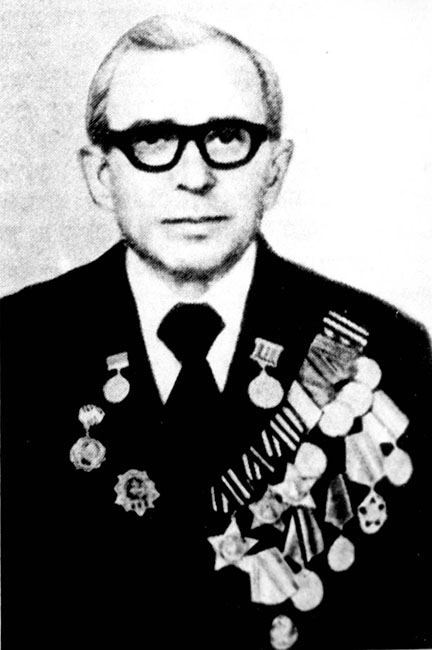Leonid Blat was born in 1923 in Leningrad. In June 1941 he volunteered for active service and took part in fighting on the Leningrad Front. In September 1941 Leningrad was blockaded. In an effort to break the blockade, during the night of September 20, Soviet paratroopers who were landed in the area of Nevskaia Dubrovka succeeded in occupying a small area 2 kilometers long and only 800 meters wide. This was later referred to as the Nevskii piatachok (Neva Bridgehead). Among those paratroopers was Sergeant Leonid Blat. He was wounded in the shoulder during the battle. Two months after returning to his unit from the hospital, Blat was awarded the Medal of Valor. In January 1943 he took part in the breaching of the Leningrad blockade and, one year later, in its total elimination.
Subsequently, the infantry division to which Blat was assigned fought in Karelia, Estonia, and Poland. In the summer of 1944, with the destruction of the heavily fortified Finnish defenses in Karelia, as commander of a communications unit, Blat succeeded in maintaining contact between the command point of the head of the artillery division and the artillery units. After telephone contact had been cut off, Blat encountered Finnish intelligence men. He engaged them in combat, destroyed their unit, and reestablished communications. For this action, on June 25, 1944 Blat was awarded the Order of Glory, 3rd class, one of the highest decorations for non-officers in the Red Army.
During the Soviet advance north of Warsaw in January 1945 Blat was personally responsible for maintaining contact between the commander of his division's artillery and the batteries that were covering the attack of the Soviet infantry. When the enemy counterattacked Blat, who was on the phone line, saw 16 enemy tanks approaching. Under fire from machine-guns and tanks, Blat contacted the battery command point and directed the Soviet artillery fire. As a result the German tanks were halted. For this achievement, on February 16, 1945 Leonid Blat was awarded the Order of Glory, 2nd class, and slightly later, the Order of the Red Star.
In the fighting for Danzig (today Gdańsk, Poland), at that time a senior sergeant, under heavy artillery fire Blat again found himself with a broken communication line. During this operation he eliminated more than 30 obstructions and also helped direct Soviet artillery fire. After the war ended in victory, on July 29, 1945 Blat was awarded the Order of Glory, 1st class, the highest decoration for a Red Army soldier.
In February 1947 Leonid Blat was demobilized. He returned to his native Leningrad. Blat died in 2012 and is buried in the Jewish cemetery of St. Petersburg (formerly Leningrad).







